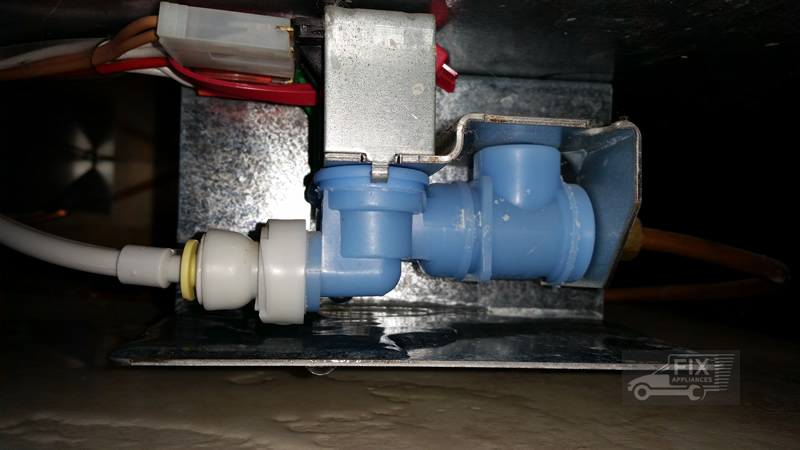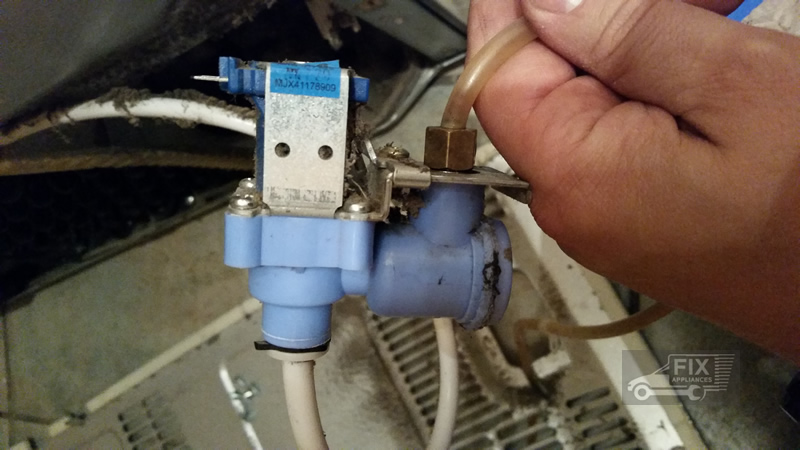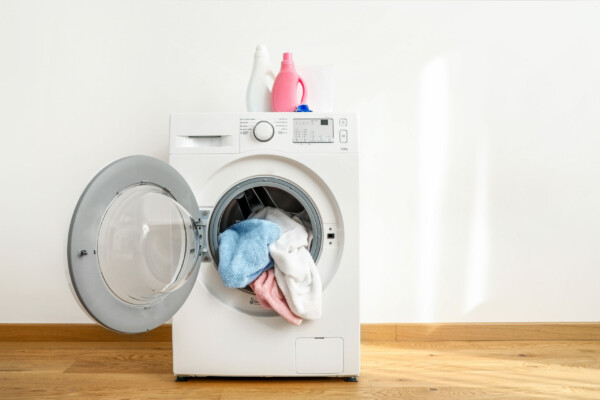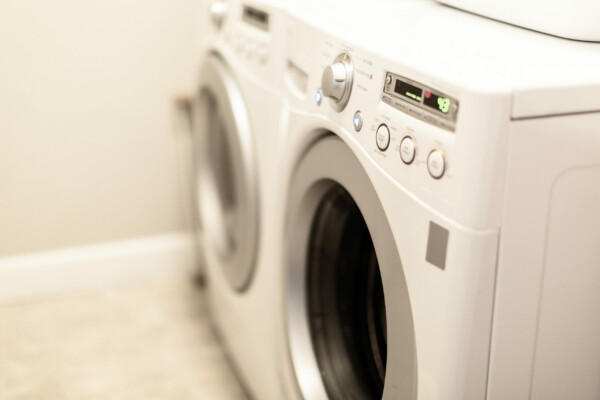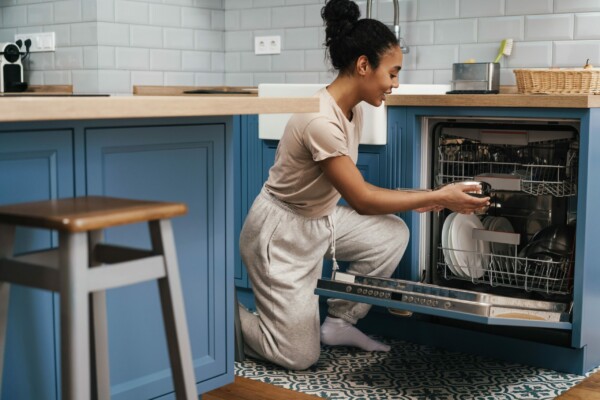What Could Be Causing Your Fridge To Leak?
In this article…
- Fridge leaking problems always come unexpectedly…
- Clogged Defrost Drain
- Water Valve or Pipe Failure
- Water Filter Connection
- Door Seal Failure
- Cracked or Improperly Positioned Drain Pan
- Loose or Damaged Ice-Maker Tubes
Fridge Leaking Problems Always Come Unexpectedly…
Have you ever headed to the kitchen for a midnight snack only to discover that your socks were wet when you got close to the fridge?
While you may have assumed that someone spilled something on the floor and was too tired to turn on the light to check it out, you may want to troubleshoot what happened before it became a major leaking problem.
In addition to causing concern for an electric shock, a slipping hazard, or possible floor damage, water leaks can be a sign of a serious refrigerator malfunction. To avoid the risk of any of these problems, the fridge’s water leak should be addressed immediately.
Leaking Fridge Problems and Solutions Table:
| Leaking Fridge Problems and Causes | Possible Solutions |
|---|---|
| Inside Water Leak (Interior defroster drain line problem) | Check for a clogged defrost drain in the freezer. – Inspect and flush the drain with warm water. – If the problem continues, it’s advisable to consult with a qualified professional for assistance. |
| Rear Water Leak (Problem with an ice maker or water line) | Inspect water line connections at the rear of the fridge. – Check for water around the ice maker area. – Look for signs of moisture or leaks in the ice maker components. – Call a certified technician if needed. |
| Front Water Leak (Clogged drain tube) | Clear any clogs in the drain tube. – Use warm water to flush the drain tube. – If the issue persists, it’s best to seek the expertise of a professional for assistance. |
| Bottom Centre Leak (Drain pan issue) | Inspect the drain pan for cracks or damage. – Replace a damaged drain pan to prevent water overflow. – Address any issues with the condenser fan or drain system. |
| Clogged Defrost Drain | Remove and clear any obstructions in the defrost drain. – Ensure proper drainage of condensation from the freezer. – Consider professional assistance if the blockage is persistent. |
| Water Valve or Pipe Failure | Check the water line connections from the wall to the appliance. – Examine the waterline at the bottom of the fridge for leaks. – Inspect the solenoid switch and water valve for malfunction. – Call a certified technician for repair or replacement. |
| Water Filter Connection | Replace the water filter if leaks result from poor connection or improper installation. – Ensure proper filter sizing and model. – Contact an appliance repair company if issues persist. |
| Door Seal Failure | Clean the rubber door seals to remove dirt and residue. – Adjust the fridge’s levelling to ensure proper door sealing. – Tighten bolts holding the refrigerator door(s). – Replace worn or torn door seals. |
| Cracked or Improperly Positioned Drain Pan | Inspect the drain pan for cracks or incorrect positioning. – Replace a damaged or improperly installed drain pan. – Address any issues with the condenser fan and drainage system. |
| Loose or Damaged Ice-Maker Tubes | Check the water line to the ice maker for loose connections or damage. – Examine the entire water line length for signs of moisture. – Tighten loose connections and replace damaged components. – Seek professional assistance if the problem persists. |
This table provides a comprehensive guide to common problems associated with refrigerator leaks, their potential causes, and corresponding solutions for each issue. It serves as a valuable reference for individuals experiencing water leakage problems in their refrigerators and helps them diagnose and address the specific problem based on its symptoms. The table covers various areas of potential leakage, including interior and exterior sources, water supply components, and appliance parts. It emphasizes troubleshooting steps that users can take to resolve the issue and highlights instances where professional assistance may be necessary for more complex problems.
Before You Start Tearing Your Fridge Apart, Consider This:
The technicians at FIX Appliances CA are experts at repairing all make, models and types of refrigerators, but knowing where the leak is coming from and what causes a fridge to leak will help get your refrigerator up and running in no time. Water in these areas will likely point to specific problems that leaking fridges causes
- Inside water leak—interior defroster drain line problem.
- Rear water leak—problem with the ice maker or water line.
- Front water leak—clogged drain tube.
- Bottom centre leak—drain pan issue.
“When dealing with refrigerator leaks, addressing the root cause promptly is crucial. Simple issues like a clogged defrost drain or loose ice-maker tubes can often be resolved with DIY methods. However, for complex problems such as water valve or pipe failure, seeking professional assistance is advisable to ensure a thorough and safe repair. Regular maintenance, like cleaning door seals and inspecting the drain pan, goes a long way in preventing leaks and extending the life of your appliance. Remember, a swift and accurate diagnosis by certified technicians, such as those at FIX Appliances CA, can provide peace of mind and efficient solutions for a hassle-free refrigerator repair experience.”
Oleg Chudnovski, CEO
To Learn How to Fix a Leaking Refrigerator, Take a Look at These Common Leaking Problems
Clogged Defrost Drain
If the fridge leaks inside, you probably have a clogged defrost drain in the freezer. Today’s freezers run on a cycle of freezing and defrosting, constantly producing condensation. The excess moisture travels down the defrost drain and is caught by the drain pan under the fridge.
The narrow drain can easily get clogged with food scraps and ice fragments, or it may freeze solid. This can lead to water accumulation from the defrost cycle, resulting in leaks onto the floor. Typically, drain lines are located behind the crisper drawers. If you can access the top of the drain outlet, check for any obstructions. Flushing the drain with warm water often helps clear the blockage. If the problem persists, it’s advisable to enlist the assistance of a professional for further investigation.
Water Valve or Pipe Failure
A water leak at the rear of your refrigerator is generally related to a water valve or pipe failure connected to operating a water dispenser or ice maker. This is usually a job for a certified technician, but you can help save time by pinpointing the exact leaking area.
To mitigate the risk of electrical shock, move your refrigerator away from the wall and disconnect it from the power outlet. First, check the water line from the wall to the appliance. Is it wet at the joints, or is water running down the pipe? Next, look at the waterline at the bottom of the fridge that connects to the back of the freezer. Is there water on the floor? Is it dripping from the connection point?
A solenoid switch controls the water valve in the refrigerator by opening and closing as needed. This is a standard fridge leaking point and may need to be replaced. Valve failure in the wall that operates the ice maker and water dispenser can also be a problem and a source of leaks. Look for holes or wet spots. These areas should be completely dry if operating correctly.
One last check – ensure the water line is secured and not leaking directly onto the floor.
If you discover leaks or holes near the water valve or pipes, it’s best to contact a service professional to fridge appliance repair the problem. If water pipes are replaced, be sure to change the filter.
Water Filter Connection
Many refrigerators require a water filter that should be replaced every seven months. Unfortunately, this can be a source of water leaks for some reasons:
- Poor connection between the filter and the supply line
- Improper installation
- Incorrect size
- Wrong model
- Cracked housing or seals due to age
In any of these instances, you’ll notice water running down the outside of the filter to the inside of the fridge. Try removing and replacing the filter with the manufacturer’s recommended model. If the problem persists, contact an appliance repair company for evaluation and diagnosis.
Door Seal Failure
Surprisingly, a puddle under your refrigerator may not be caused by a leak but by excess condensation from a door not sealing properly. If the rubber door seals are compromised, your refrigerator will run constantly. This will lead to condensation build-up on the coils and water leaking from the fridge on the floor.
Try washing the gaskets with warm, soapy water to remove dirt build-up and sticky residue. Also, make sure your fridge is leaning slightly backward (you can lower the adjustable legs to do this.) If it’s leaning forward, the door may not seal properly. Check that the bolts holding the refrigerator door(s) are tight and hold the door in place. Torn or worn door seals should be replaced.
Here Are a Few Less Common Areas to Inspect for Refrigerator Leaks
Cracked or Improperly Positioned Drain Pan
During the defrost cycle, your refrigerator drains into a drain pan underneath your appliance. This prevents water from collecting inside the fridge. The condenser fan blows warm air across the pan, and any excess water generally evaporates before overflowing.
While relatively uncommon, a drain pan will occasionally become cracked or damaged. It can also be installed improperly so water drains to the floor. Pull the pan out and examine it for cracks or holes. A damaged drain pan should be replaced soon to reduce the risk of water overflows and electric shock.
Loose or Damaged Ice-Maker Tubes
Look at your ice maker if you’ve exhausted all other options and your fridge is still leaking. This isn’t usually a place of concern, but the water line to the ice maker may come loose or become kinked. Seals and plastic hoses can also crack and tear as they age, leading to water leaking from the refrigerator.
Look at the back of your fridge and examine the entire water line into the ice maker. Check the connections, too, watching for signs of moisture. Tighten any loose connections. If this still doesn’t correct the problem, give FIXAppliances.CA a call. A courteous, skilled technician will visit your home and provide an affordable solution to your problem.
If you’re not sure:
It’s sometimes difficult to determine the exact source of a fridge leak, so a professional evaluation from an appliance repair service like FIX Appliances CA may be necessary.
If you suspect that the liquid on your floor is not water but possibly refrigerant, it’s vital that you contact a technician immediately. During refrigeration, the mixture transitions between a liquid and gas many times. If this toxic material leaks outside the refrigerator, it can cause significant health risks and should be addressed immediately.
Is Your Refrigerator Still Leaking? Choose a Trusted Authorized Appliance Repair Service for Peace of Mind
No worries, we are a few clicks away;- FIX Appliances CA is a reputable and authorized repair center that serves various home appliance brands. Our vast experience covers over 90 top manufacturers, streamlining your appliance repair needs without requiring multiple service providers. We prioritize efficiency, aiming to attend to most repair requests on the same day to minimize any disruptions to your daily life.
Troubleshooting your refrigerator leak may take some time, but utilizing this simple guide will keep the appliance up and running correctly in no time. If you have questions about refrigerator maintenance or require a service visit, contact FIX Appliances CA online or by calling 1-888-242-0777 today. Same-day refrigerator repair is available in Barrie, Bradford, Newmarket, Toronto, and the GTA for your convenience.
Date of page creation: September 08, 2016
Page update date: February 16, 2024
Ask a Question
